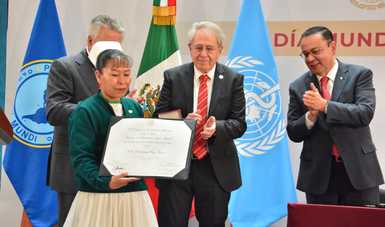Health is a basic social human right, which should go beyond their working condition, their social class and geographical location, said the Minister of Health, Jorge Alcocer Varela at the presentation of the Report of the High Level Commission "Universal Health in the XXI Century: 40 years of Alma-Alta. Which was held as a celebration of the World Health Day, led by the Mexican President Andrés Manuel Lopez Obrador and the General Director of the Pan American Health Organization (PAHO), Carissa Etienne.
Alcocer Varela stressed out that 40 years after the declaration of Alma-Alta, Mexico has not made enough progress in providing universal attention to the population, on the contrary, the health gap has spread even more, after the decree to guarantee the Right to Health was mixed-up with a concept of financial coverage for health.
"By creating and promoting mixed health systems, with corrupt institutional processes, income concentrations and capital deregulation, the attention of poor communities was conditioned to government subsidies, often deficient, while people with economic resources chose private medicine" , he pointed out.
With the presence of the Assistant Secretary General of the Organization of American States, Nestor Mendez, Ministers of Health, and members of delegations from Latin American countries, the Minister of Health emphasized that the people in the region of the Americas urgently need governments that firmly, wisely and with equity in mind stop bureaucratic practices, political pressures or historical inertias.
"The Health System in the Fourth Transformation, is born with the absence of fear, to get rid of a harmful tradition that did not understand the illusion of seeking healthy lives and wellbeing of our people," he said.
The Director General of the PAHO, Carissa Etienne, said that health is not a privilege, it is a fundamental right, and to make it universal is feasible and necessary.
But we will not achieve it, she added, if we do not face social inequality and the existing lags in the medical care of the population, especially in subjects such as teenage pregnancy, sexually transmitted diseases, homicides, suicides and migration.
She said that universal healthcare goes beyond coverage. "Access to high quality services, timely interventions, the right to equity and respect for human rights should be provided; especially of people who live in social and economic inequities".
Finally, he congratulated the Government of Mexico for promoting deep transformations in the Health System, with the aim to achieve the universality of healthcare.
In turn, the United Nations High Commissioner for Human Rights, Michelle Bachelet, said that the conditions are in place to make health systems more effective and legitimate, to reduce the gap between healthcare needs and the public response.
She added that it is not enough to declare health as a universal right. "We want it to be a right for all, not a privilege for some. For all, we must offer explicit and verifiable guarantees”.
In this regard, she said that the Alma-Ata's Declaration is a strategic framework to organize the government’s responsibilities and the integration of the communities.
She is convinced that states can do more. They must commit to greater equity and quality.
According to her, the report proposes primary healthcare as an effective strategy so that the government and the civil society can transform the health systems and act upon social and environmental determinants of the population’s health.
She explained that primary healthcare holds a strategic role because it is locally where all the variables materialize, including health promotion and strategies for preventive care, coordination of public policies, territorial variables, proximity of health personnel, and community participation.
Michelle Bachelet affirmed that the banner for the right to health is raised, and called on the health ministers to participate together to ensure that every human being has access to the same level of possibilities of respect, well-being and dignity.
Dr. Jorge Alcocer Varela and Carissa Etienne signed the agreement of Adhesion of Mexico to the Revolving Fund of Vaccines and Strategic Fund of Medicines of PAHO / WHO.
During the ceremony, the Secretary of Health, Jorge Alcocer Varela and the Secretary of the General Health Council, José Ignacio Santos Preciado, gave the 2019 Medical Merit Awards.
The "Eduardo Liceaga" Award for Medical Sciences and Healthcare Administration, was for Dr. Marco Antonio Martinez Rios, for his work in favor of the Mexicans health.
The "Miguel Otero" Prize for Clinical Research was for Dr. Celia Mercedes Alpuche Aranda; the "Gerardo Varela" Award for Public Health went to Dr. Abelardo Cesar Avila Curiel; the "Manuel Velasco Suárez" prize, for Neurology and Neurosurgery, to David Lozano Elizondo.
The "Guillermo Soberon Acevedo" Award, for the Development of Institutions, went to Samuel Karchmer Krivitzky; the "Ramon de la Fuente Muñiz" Prize, for Mental Health, was awarded to Dr. Carlos Serrano Gómez; the "Martín de la Cruz" Merit Award, for Chemical Research and Biology, went to Alexandre Cardoso Taketa; the "Dr. Margarita Chorne Sanchez” Prize, for Stomatology, was awarded to Sergio Sanchez Garcia.
The "Diaz Francisco Jimenez" Prize for Primary Care was awarded to the Lieutenant Colonel, Master of Science, Carlos Dario Duque Coutiño; the "Refugio Esteves Reyes" Nurse award to Cristian Escalante Perez, for outstanding professional services in areas of conflict or disaster.
The "Isabel Cendala y Gomez" Nurse Award, for Public Health and Community Nursing, went to Elva Sugey Torres Soria; the "Lucia Salcido" Award went to the Guadalupe Ortiz Rivas, for her excellent career and work.
Follow us on Twitter:@SSalud_mx
Facebook: @SecretariadeSaludMX
You Tube: Secretaría de Salud México
Instagram: ssalud_mx
